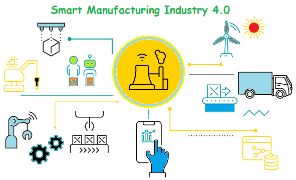Introduction
The manufacturing landscape has witnessed significant transformations over the years, and with the advent of Smart Factory Industry 4.0, a new era has begun. This innovative approach combines cutting-edge technologies, automation, and data exchange to revolutionize traditional manufacturing processes. Smart Factory Industry 4.0 harnesses the power of interconnected systems, real-time data analysis, and intelligent automation to optimize efficiency, enhance productivity, and streamline operations in factories.
In this article, we will delve into the world of Smart Factory Industry 4.0, exploring its key components, benefits, and implications for the manufacturing industry.
Key Features of Smart Factory Industry 4.0
Smart Factory Industry 4.0 encompasses several key features that differentiate it from traditional manufacturing setups:
- Interconnectivity: Smart factories leverage the Internet of Things (IoT) to connect various components, allowing seamless communication and data sharing between machines, devices, and systems.
- Real-time Data Analysis: Advanced analytics and artificial intelligence enable real-time data collection, analysis, and insights. This empowers decision-makers with actionable information to optimize production processes.
- Automation and Robotics: Smart factories embrace automation to a greater extent, employing robots and autonomous systems for tasks such as assembly, packaging, and quality control.
- Integration of Cyber-Physical Systems: Cyber-physical systems, which combine digital and physical elements, form the backbone of Smart Factory Industry 4.0. These systems enable seamless coordination and synchronization of manufacturing operations.
- Flexibility and Customization: Smart factories offer increased flexibility to adapt to changing market demands and individual customer requirements. Customization and personalization of products become easier and more efficient.
Advantages and Benefits

The implementation of Smart Factory Industry 4.0 brings forth a plethora of advantages and benefits for manufacturers:
- Increased Efficiency: Smart factories optimize production processes through automation, reducing human error and improving overall efficiency.
- Enhanced Productivity: With real-time data analysis and predictive maintenance, manufacturers can identify bottlenecks, streamline operations, and maximize productivity.
- Cost Reduction: Smart Factory Industry 4.0 enables predictive maintenance, minimizing downtime and reducing maintenance costs. Additionally, optimized resource allocation and inventory management contribute to cost savings.
- Improved Quality: By integrating advanced sensors and quality control systems, smart factories ensure consistent product quality and reduce defects.
- Agile and Responsive: Smart factories enable quick adaptation to market changes, allowing manufacturers to respond promptly to customer demands and industry trends.
4. Challenges and Implications
While Smart Factory Industry 4.0 offers tremendous potential, it also presents certain challenges and implications:
- Technological Integration: The integration of various technologies and legacy systems can be complex and requires careful planning and implementation.
- Data Security and Privacy: As smart factories rely heavily on data exchange and connectivity, ensuring robust cybersecurity measures and protecting sensitive information become critical.
- Workforce Skills and Adaptation: The shift towards automation and smart technologies necessitates upskilling and reskilling the existing workforce to effectively operate and maintain these advanced systems.
- Infrastructure Requirements: Smart factories require robust and reliable infrastructure, including high-speed connectivity and compatible machinery, which may require significant investments.
- Ethical Considerations: The increased reliance on automation raises ethical questions related to job displacement, worker safety, and the responsible use of artificial intelligence.
Conclusion
In conclusion, the rise of the Smart Factory in Industry 4.0 marks a significant shift in manufacturing. With the integration of advanced technologies like IoT, AI, and automation, smart factories offer increased efficiency, productivity, and flexibility. They enable real-time data analysis, predictive maintenance, and seamless communication across the entire production process. Embracing Industry 4.0 and implementing smart factory solutions has become essential for businesses aiming to stay competitive in the evolving digital era.

